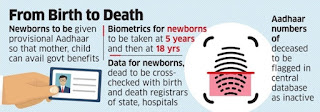New-borns will soon receive a temporary Aadhaar number, to be upgraded with biometric data on attainment of majority, as the Unique Identification Authority of India prepares to launch two ambitious pilot programmes aimed at plugging misuse and deepening its reach. It will also integrate its data with death registration records to prevent misappropriation of government benefits by using Aadhaar numbers of deceased citizens.
The world’s largest biometric identity database, which has enrolled nearly all of India’s adult population since its launch in 2010, is now looking to expand the ambit of Aadhaar to cover a person’s entire life cycle from birth to death.
“The allocation of a UIDAI number at birth will ensure that children and families benefit from government programmes and no one is left out of the social security net,” said one official cited above. The integration of Aadhaar numbers with the country’s death registration databases as well as with that of public and private hospitals is aimed at stemming the leak of direct benefit transfers.
The pilot for these two programmes will begin soon. “Biometrics for kids are taken when they are at least five years old. Our teams can visit these newborns’ families after that period and complete the formalities of registering their biometric, and allocating them a permanent Aadhaar number,” said a senior official. Further, once a child turns 18, biometrics are re-registered “as these parameters stabilise by then and remain the same for an (individual’s) remaining natural life,” the person added while noting that “it will also ensure that multiple IDs are not generated for the same child.”
Since launch, Aadhaar numbers have been provided to most Indian adults with coverage in the 5-18 year age group estimated at 93%, but only a quarter of the infants below five years are registered with the database. Pointing out that the provision to allocate provisional Aadhaar numbers for new-born kids existed since its inception, Ashok Pal Singh, a former deputy director-general with UIDAI said it was “encouraging to see the plan being implemented now.”
In addition to cross-verifying data with city and state birth registration databases, UIDAI also plans to approach public and private hospitals for data on the deceased to ensure there is no duplication, officials said. The spike in death rates due to the Covid pandemic has led to an increase in cases of direct benefit transfers still being remitted to the Aadhaar numbers of deceased citizens, according to government sources. “Pensions of people who have passed away recently are still being withdrawn or automatically credited to their accounts as the Aadhaar number is still active. That is undesirable,” they added. Further, in a bid to prevent the generation of fake numbers or allocation of multiple Aadhaar numbers to the same person, the UIDAI also plans to allot the ‘Zero Aadhaar’ only to those people who are introduced by Aadhaar introducers with a verified “electronic sign”.
A‘Zero Aadhaar” number is given to a person who does not have documents for birth, residence or income proof such as birth certificate, house or income tax return receipts, among others. A person is “introduced” to the Aadhaar ecosystem by an Aadhaar introducer who is, from time to time, notified by a registrar of the regional office of UIDAI.





No comments:
Post a Comment